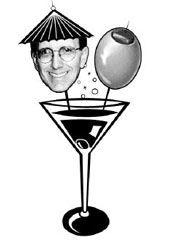WHY ISN’T ANYONE running against Nick Licata?
As Licata runs for his second term as a City Council member, he has the good fortune to have an opponent, Peter Olive, who is not actively campaigning in any fashion whatsoever.
Licata’s lack of a serious opponent is astounding when you consider that he seemed the most vulnerable of the incumbent City Council members. Before his election to council, Licata spent years fighting corporate welfare. He opposed public funding of new stadiums for the Seahawks and Mariners, as well as City Hall’s sweetheart deal to get a new Nordstrom headquarters, a spiffy Pacific Place mall next door, and an open street through Westlake Park. In 1997, in order to get onto the council, he ran a tough race against Aaron Ostrom, an environmentalist. Ostrom drew strong establishment support and raised more money than Licata, but in the end, Licata squeaked out a victory 52 percent to 48 percent.
Since joining the council, Licata has consistently been a champion for tenants, the homeless, artists, clubs, the monorail—in short, all the people and causes that are traditionally unpopular with City Hall, Mark Sidran, and the business community. During last year’s presidential contest, he urged Seattleites to hold their ballots until the last possible minute: If the race was close, vote for Al Gore; if it was one-sided, vote for Ralph Nader, he counseled. While this rabble-rousing has made Licata friends, few of them vote—and even fewer have any money.
The other City Council incumbents running this year—Richard Conlin, Richard McIver, and Jan Drago—all drew credible opponents. While the incumbents are mostly favored to win, none of them can take their re-election for granted. Licata can.
What’s going on here?
Conlin’s consultant, John Wyble of Moxie Media, is surprised. “The first six months of the year, there were all these rumors that the business community was going to run someone against [Licata]. Why is the business community sitting out?”
Walt Crowley of HistoryLink.org says the business community has calmed down about Licata. “Initially, in the fervid imaginings of corporate boardrooms, [Licata] was the vanguard of a Bolshevik revolution that was going to nationalize Starbucks.” Now Licata “is respected across the board,” Crowley says.
In addition, Christian Sinderman, Drago’s campaigner, notes this year’s council challengers are more from the left. He characterizes them as “monorail advocates and Green Party people. Licata is closer to them ideologically.”
All three observers agreed that Licata’s honesty, accessibility, and diplomatic style have earned him points with people who disagree with him politically. Licata’s lack of an opponent means “he doing a good job,” Crowley says.
Licata’s easy re-election run also allows him to contemplate the future: He says he wants to be City Council president. The last two council presidents have been Jan Drago and Sue Donaldson, and Margaret Pageler currently holds the post; all are more conservative than Licata. The council presidency is neither merely ceremonial nor a real position of authority. “It’s significant but subtle,” says Crowley. The presidency changes every two years and is elected by a majority vote of the council’s nine members. The council president helps “set the [council’s] agenda, establish [the council’s] public persona, and influence the allocation of council staff and resources,” says Crowley.
Conlin also has announced he will seek the council presidency, and Licata wonders if Drago might be interested in another term. The outcome of the mayor’s race might determine who the council wants as its chief. Both Drago and Conlin have consistently backed Mark Sidran’s “civility” campaigns, while Licata has opposed them. Will the council want to declare its independence from Mayor Sidran or its subservience to him? Likewise, in the more probable scenario that liberal Greg Nickels is elected, will the council want a more conservative member than Licata at its helm? The race for council president probably won’t come down to these ideological issues. More likely it will be a matter of communication skills, personal relationships, and who wants which committee chairmanships. Licata should fare well in a race like that.
NICK’S QUIPS
On being wooed by both mayoral candidates with offers of lunch: “I’m thinking of calling them back and seeing if I can get a dinner out of them.”
On Mark Sidran: “He’s telling the truth about Sound Transit’s [light rail], but he’s done it out of political expediency. He has no sense of constitutional rights. For him, they are a bother. “
On fighting for unpopular constituents: “You could stick them up on a wall and throw tomatoes at them and get more votes.”








